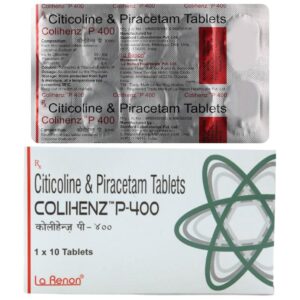PIRACETAM + CITICOLINE SODIUM
Piracetam: Piracetam is a nootropic drug that is used to enhance cognitive function and memory. It belongs to a class of compounds known as racetams.
The exact mechanism of action of Piracetam is not fully understood. It is believed to work by affecting the brain’s neurotransmitter systems and enhancing cerebral blood flow and oxygen utilization. It may also protect against oxidative damage and have neuroprotective effects.
Piracetam is primarily used to improve memory and learning ability. It is commonly prescribed for individuals with age-related cognitive decline, dementia, Alzheimer’s disease, and other neurodegenerative disorders. It is also sometimes used off-label for conditions such as mental fatigue, ADHD, and dyslexia.
The recommended dose of Piracetam is typically between 1,200 and 4,800 mg per day, divided into two or three doses. The dosage may vary depending on the individual and the condition being treated. It is usually taken orally and can be taken with or without food.
Overall, Piracetam is considered to be safe and has a low risk of side effects. Some common side effects may include nervousness, anxiety, insomnia, headache, dizziness, gastrointestinal discomfort, and skin rash. These side effects are usually temporary and mild. However, it is important to consult a healthcare professional if any severe or persistent side effects occur.
It is worth noting that Piracetam has not been approved by the FDA for medical use in the United States, but it is available as a dietary supplement. As always, it is important to consult with a healthcare professional before starting any new medication or supplement.
Citicoline Sodium: Citicoline Sodium, also known as CDP-Choline or cytidine diphosphate-choline, is a nootropic drug that is used to improve cognitive function and treat certain neurological disorders. It is available in tablet or injection form.
The mechanism of action of Citicoline Sodium involves its conversion into choline and cytidine in the body. Choline is then used to synthesize acetylcholine, a neurotransmitter responsible for various cognitive functions such as memory and learning. Additionally, cytidine is converted into uridine, which plays a role in the synthesis of phospholipids, specifically phosphatidylcholine, an important component of cell membranes.
The recommended dose of Citicoline Sodium varies depending on the condition being treated. For cognitive enhancement or age-related cognitive decline, the typical oral dose is 250-500 mg twice daily. In cases of acute ischemic stroke or traumatic brain injury, a higher intravenous dose may be administered initially, followed by a maintenance oral dose.
Common side effects of Citicoline Sodium may include headache, gastrointestinal discomfort (such as nausea, diarrhea, or stomach pain), insomnia, and dizziness. These side effects are usually mild and transient. Some individuals may also experience allergic reactions, although these are rare.
It is worth noting that while Citicoline Sodium is generally considered safe for most people, it is always important to consult a healthcare professional before starting any new medication, as they can provide personalized guidance and monitor for any potential drug interactions or contraindications.

